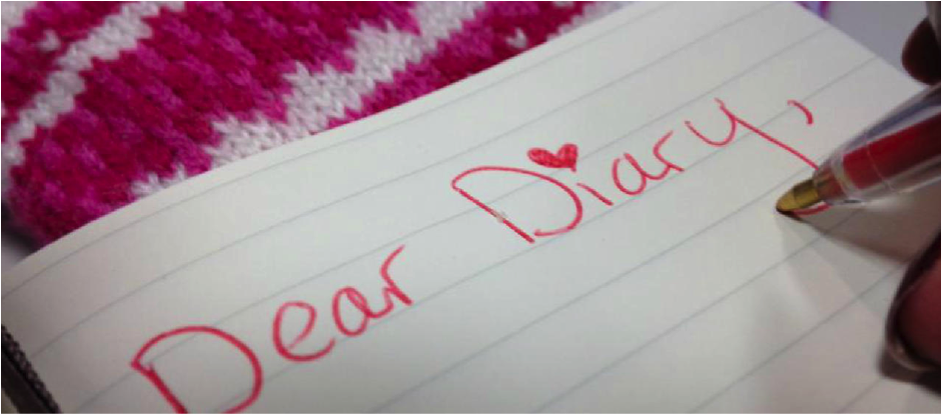By Sophia Simon-Bashall
I feel as though when I say that I keep a diary, people look at me differently. There’s something judgemental in their response. That’s something that I’m used to, because I was a teenage girl for a pretty long time, and I’m a massive One Direction fan – most people tend to look down on people who meet this criteria. Actually, there’s a link there. People who like One Direction and people who write diaries can be anyone, but what demographic are they traditionally associated with? That’s right – teenage girls.
Obviously, I’m a cheerleader for teenage girls. I love teenage girls and I have experienced first-hand how smart they can be, how kind they can be, how strong and brave and creative they can be.
I am also a cheerleader for diaries and journaling. I believe that there is so much value in this practice, especially as something in the life of a teenage girl.
In a culture which teaches girls to hold back our emotions; to be good and sit pretty; where we are to be seen and not heard – writing a diary is an amazing release. Our diaries are private spaces, and nobody can criticise or judge us. Our diaries are places where we are allowed to let it out. All of it.
Anger is a particularly difficult emotion for a lot of girls to express, because we’ve been taught that it’s an ‘ugly’ emotion. I really struggle with it, and tend to only ever direct it onto myself. But if I take the time to sit down with my journal (or any old notebook, even a scrap piece of paper – and failing that, the notes app in my phone) I can get out some of that pent up rage. I can release my frustrations, and it doesn’t cause any harm to me or to anyone else. I also like that because nobody else is going to see what I write, it can be messy visually, too. I like things to be ‘perfect’, because I like to have people’s approval. In the comfort of my own pages, I don’t need anybody’s approval. I can, for once, relax, and scribble away.
It’s not just the emotions of girls that are undervalued, but our everyday experiences. We are taught to value what upper-middle class white men say, and to ignore the lessons we learn in our own lives. We learn early in life to question what we have to contribute to the world, we are told the story of our irrationality, our fickleness, our naivety. When we write in our diaries, we tell ourselves a new narrative. When we write about our lives, we are writing to remind ourselves that we have something to say and that it matters.
As a teenage girl, I was told often that my mood swings were normal, ‘just hormonal’, and that I was overdramatic. Now, I cannot say that I was not dramatic – I remain so to this day – but I can say that these comments were dismissive. They told me that other people knew best what was going on in my head, and that stopped me from talking about it. I even told myself, “you’re making this all up”, “this isn’t real”. I didn’t believe in my own version of events, I didn’t trust myself in the slightest. Finding that self-trust is something I’m still working on. But I am always learning, and my diary is instrumental in that discovery. At 15 years old, reading my own diary entry from the day before was what made me wake up, and realise that what was going on in my head was serious. At 19, it is what made me stop denying the truth and recognise the significance of what I was feeling – my diary helped me to end a relationship I was no longer happy in, and leave a space that was triggering my anxiety and depression to the extreme. My diary saved me from my own denial.
This record of memories and the validation of our personal experiences is also important to our identity. It is so easy for your sense of who you are to get tangled up with who you’re ‘supposed to be’. Teenage girls are thrown hundreds of mixed messages every single day, and we lose ourselves to it all. We allow ourselves to be defined by others and simply categorised. Not because we want to be, but because it’s overwhelming, and it can feel like the easiest option to play pretend. But in our diaries, we can take off the masks. We can be honest, and that is healing.
Nobody’s identity is static, but mine is particularly erratic. I have spent my life moulding myself into different forms, usually out of a sense of desperation, a need to be seen, a fear of being abandoned by the people I loved. For me, identity is something I don’t understand – none of the people I’ve been in the past really feel like me. When I read through old diaries, it’s painful. “I don’t know her”, I think, going through the journal I kept during my hospitalisation at 15 years old. But as uncomfortable as my past selves make me, it’s important that I connect with them, learn to accept them and, ultimately, forgive them. And when I read my old diaries, I learn about who they were, and by extension who I am. This was the only place that I was honest, and so it gives me an insight to thought patterns; shows me the consistencies in my likes and dislikes; proves to me that there is a thread which connects me to myself. I’m not just fragments.
This post was brought to you in collaboration with Powered By Girl.
